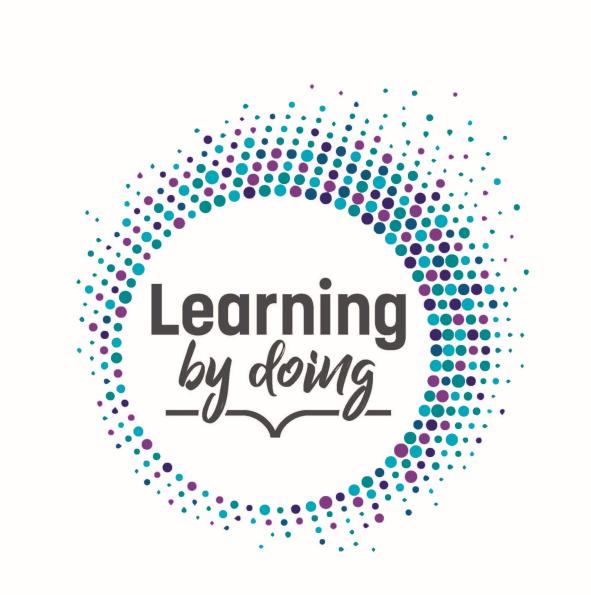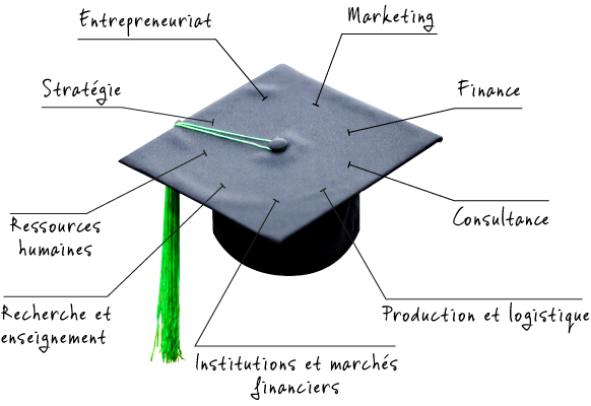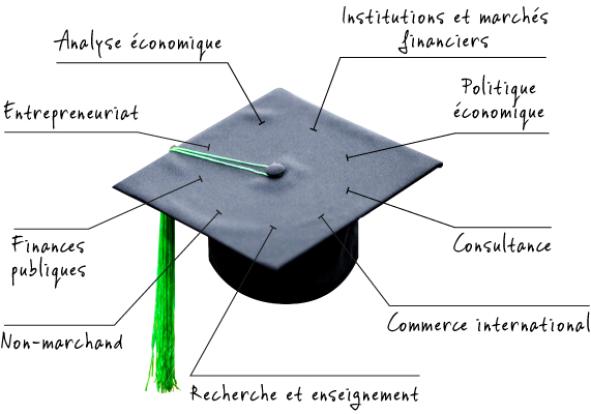Bachelor in Economics and Management
-
Schedule
regular course
- ECTS Credits 180

Your program is based on 5 pillars
First, economics and management. These subjects form the core of the training. Right from the first year, you dive into these subjects and discover marketing, finance, accounting, monetary economics, international economics, strategy... In the third year, you specialize in the area that interests you most by selecting a track in economics (environmental economics, growth and development and innovation and the labor market) or management (operations management, strategy and leadership, business games, organizational theory and diagnostics).
Quantitative methods and computer science are also an important part of your program. Indeed, to make the best decisions, you need to master and know how to critically apply mathematics, statistics and computer science.
The curriculum also confronts you with the human sciences, with subjects such as history, sociology, psychology and philosophy. These disciplines are essential if you are to better understand the environment in which you will be required to operate and make decisions. The same applies to law, the legal and regulatory framework constraining corporate action and all the managerial decisions you'll have to make.
Finally, in a globalized world, knowledge of languages is a must. So, in addition to English, you choose a second language between Dutch, German or Spanish. More than just a means of communication, languages convey a culture, and mastering them is a major asset for any manager.What's more, as part of language learning, part of the course is taught in English, and a double Bachelier degree with Ghent University offers interested students the chance to spend their third year in Dutch in Ghent.
You're off to a good start
- you're interested in the economic, managerial world and in the problem of the appropriate use of resources;
- you're keen to analyze the causes and consequences of decisions taken;
- you're comfortable with mathematics;
- you're creative, solution-oriented and enjoy working in a team;
- you're willing to speak several languages;
- you'd like to benefit from international experience.
Teaching methods
Courses, exercises, integrated projects, company visits, business games... everything is done to ensure excellent mastery of concepts and the development of practical skills.

In small groups, exercise sessions and practical work help you assimilate the material based on case studies and the experiences of corporate managers.
Your meetings with professionals bring you face to face with current affairs and business practice. You develop your understanding and critical thinking, but also your creativity.
In the shoes of corporate managers during business games, you'll acquire decision-making skills in a computer-simulated competitive context.
Last but not least...you benefit from real proximity to teachers and assistants!

Project managers and change agents from the baccalaureate!
Project-based learning crosses and mobilizes your knowledge of several disciplines around concrete cases.
Like true project managers, you learn to work collaboratively and demonstrate multiple skills:
- from observation, documentary research, source critique, data collection and analysis;
- to the production of a high-quality report - with, in some cases, an executive summary written in English - which you and your team present before a jury.
A team of experts coaches you in:
- the follow-up of your projects,
- your oral and written communication,
- your productions in English,
- the theoretical and practical foundations of your action proposals.
Learning by doing |
IN BLOCK 1Market diagnosis project
|
IN BLOCK 2Entrepreneurial project
OR Globalization and economic interdependencies
|
IN BLOCK 3Innovation project
AND Strategy project
What if you changed the rules of the game? |
International experience
Discover the international and multicultural context, learn to manage a project and communicate in another language!
Your studies in economics and management offer you the opportunity to complete two international study stays: one as a bachelor and one as a master, in Flanders, Europe or outside Europe. It's also possible to carry out your master's internship abroad.
Barcelona, Madrid, Milan, Rome, Galway, Tampere, Maastricht, Debrecen as well as the USA, Canada, Brazil, Japan and many other destinations await you!
Success aids
Succeeding in a year of study at university involves many challenges.
To help you meet them, UNamur supports you in developing your disciplinary, methodological and human skills... with the support of numerous professionals.
Preparatory courses, individualized help...
After the baccalauréat: the master's degree
The University of Namur organizes Masters in Economics and Masters in Management Sciences. These programs, organized on a daytime or staggered timetable, are directly accessible after you have obtained your bachelor's degree in economics and management sciences.
Master's degrees in economics
Daytime
- The master 120 in economics
- Le master 60 in economics
Staggered schedule
Master's degrees in management sciences
Day schedule
- The master 120 in management sciences
- The master 60 in management sciences
Staggered schedule
-
<unknown>
-
<unknown>
Code Name Staff Th.+Ex. Credits/Block 1 2 3 ECONB311 Environmental economics Baland Jean-Marie 30h th. + 15h ex. 5 Soft skillsECONB312 Growth and development Houssa Romain Guirkinger Catherine 45h th. + 15h ex. 5 ECONB313 Innovation and the labour market Hungerbuhler Mathias 45h th. 5 ECONB907 Institutional Foundations of Markets Lefebvre Perrin 30h th. 5 -
<unknown>
Code Name Staff Th.+Ex. Credits/Block 1 2 3 EGESB313 Theory and diagnosis of organisations Ajzen Michel 30h th. + 30h ex. 5 FINT0048 Artificial intelligence: challenges and opportunities Frenay Benoît 24h th. 5 EGESB332 Operations Management De Wolf Daniel 30h th. + 15h ex. 5 EGESB385 Management simulation - Business game Zidda Pietro SOUDANT Joey 30h th. + 30h ex. 5 EGESB311 Organization and strategy Castiaux Annick 30h th. + 15h ex. 5
-
-
<unknown>
Code Name Staff Th.+Ex. Credits/Block 1 2 3 ECGEB170 Economic facts and decisions De Crombrugghe De Picquendaele Alain 45h th. + 15h ex. 5 ECGEB261 Microeconomics Guirkinger Catherine Weynants Stéphanie 45h th. + 15h ex. 5 ECGEB366 Project: economic strategies and decisions Decerf Benoît Cheffert Jean-Marie Toulemonde Éric 90h th. + 30h ex. 10 10 ECGEB270 Macroeconomics Kiedaisch Christian Latzer Hélène 45h th. + 15h ex. 5 ECGEB371 Money and the Financial System Rychalovska Yuliya 45h th. + 10h ex. 5 -
<unknown>
Code Name Staff Th.+Ex. Credits/Block 1 2 3 ECGEB180 Fundamentals of management Zidda Pietro Guilmot Nathalie 45h th. + 15h ex. 5 Soft skillsECGEB367 Projet : innovation Latiers Mélanie Hammedi Wafa Masset Julie Dethier Véronique 90h th. + 30h ex. 10 ECGEB281 Financial and cost accounting Bernal Diaz Oscar 45h th. + 15h ex. 5 ECGEB284 Marketing Management Decrop Alain 30h th. + 30h ex. 5 ECGEB383 Finance Giot Pierre SOUDANT Joey 45h th. + 15h ex. 5 -
<unknown>
Code Name Staff Th.+Ex. Credits/Block 1 2 3 ECGEB150 Mathematics for economics and management 1 DEHAYE Jérémy 37.5h th. + 22.5h ex. 5 ECGEB151 Mathematics for Economic Analysis I Libert Anne-Sophie 30h th. + 22.5h ex. 5 ECGEB152 Statistics Kiriliouk Anna Soetewey Antoine 37.5h th. + 22.5h ex. 5 ECGEB352 Econometrics Woitrin François 45h th. + 22.5h ex. 5 ECGEB252 Probability and Mathematical Statistics Béreau Sophie 45h th. + 22.5h ex. 5 ECGEB251 Mathematics for economics and management 3 Kiriliouk Anna 37.5h th. + 22.5h ex. 5 -
<unknown>
Code Name Staff Th.+Ex. Credits/Block 1 2 3 ECGEB232 Economic Law Lachapelle Amélie 45h th. + 15h ex. 5 ECGEB130 Foundations of law De Streel Alexandre 45h th. + 15h ex. 5 -
<unknown>
Code Name Staff Th.+Ex. Credits/Block 1 2 3 ECGEB120 Philosophy De Briey Laurent Ruffo de Bonneval de la Fare des Comtes de Sinopoli de Calabre Marie-Des-Neiges 45h th. + 15h ex. 5 ECGEB321 Religious Studies Malvaux Paul 30h th. + 15h ex. 4 Translated with DeepL.com (free version)Soft skillsECGEB322 Civic engagement Rigaux Natalie Pierre Amélie 15h th. + 30h ex. 4 ECGEB121 Economic and social history Roekens Anne 45h th. + 7.5h ex. 5 ECGEB140 Sociology Rigaux Natalie 45h th. + 15h ex. 5 ECGEB221 Psychology Buxant Coralie 45h th. 4 -
<unknown>
Code Name Staff Th.+Ex. Credits/Block 1 2 3 ECGEB110 Information Systems I: Introduction and Modelling Verlaine Bertrand 30h th. + 15h ex. 4 ECGEB210 Information Systems Management Simonofski Anthony Verlaine Bertrand 30h th. + 15h ex. 5 -
<unknown>
Code Name Staff Th.+Ex. Credits/Block 1 2 3 ECGEB163 Project: economic and sectoral diagnosis Latiers Mélanie Verlaine Bertrand Zidda Pietro De Crombrugghe De Picquendaele Alain Kiriliouk Anna 30h th. + 30h ex. 5 -
<unknown>
Code Name Staff Th.+Ex. Credits/Block 1 2 3 ECGEB265 Project: Globalisation and economic interdependencies Cassan Guilhem Trimarchi Lorenzo 90h th. + 30h ex. 10 ECGEB366 Project: economic strategies and decisions Decerf Benoît Cheffert Jean-Marie Toulemonde Éric 90h th. + 30h ex. 10 10 -
<unknown>
Code Name Staff Th.+Ex. Credits/Block 1 2 3 Soft skillsECGEB264 Project: entrepreneurship Decrop Alain Béreau Sophie Latiers Mélanie Bernal Diaz Oscar Giot Pierre Bernal Diaz Oscar 90h th. + 30h ex. 10
-
-
<unknown>
Code Name Staff Th.+Ex. Credits/Block 1 2 3 EELVB390 English 3 (level B2) Foissac Patrick Hoorelbeke Christelle 30h th. 3 Soft skillsEELVB190 Anglais 1 (niveau B1+) Dupal Jérémie Bulon Amélie 30h th. 3 EELVB290 English 2 (level B1+ or higher) Hoorelbeke Christelle 30h th. 3 -
<unknown>
Code Name Staff Th.+Ex. Credits/Block 1 2 3 EELVB196 Spanish 1 (minimum level A2) Marsily Aurélie 30h th. 3 EELVB296 Español 2 (nivel B1 o superior) Marsily Aurélie 30h th. 3 EELVB396 Español 3 (nivel B1+ o superior) Marsily Aurélie 30h th. 3 -
<unknown>
Code Name Staff Th.+Ex. Credits/Block 1 2 3 EELVB192 German 1 (minimum level A2) Vanoirbeek Fabienne 30h th. 3 EELVB292 Deutsch 2 (Level B1) Vanoirbeek Fabienne 30h th. 3 EELVB392 Deutsch 3 (mindestens level B1+) Vanoirbeek Fabienne 30h th. 3 -
<unknown>
-
<unknown>
Code Name Staff Th.+Ex. Credits/Block 1 2 3 EELVB181 Kritische benadering van socio-economische onderwerpen Naveau Sophie 30h th. 3 EELVB281 De Vlaamse/Nederlandse bedrijfswereld - interculturaliteit Miceli Marc 30h th. 3 EELVB381 Bedrijfscommunicatie en sollicitatiegesprekken – B2 Hoorelbeke Christelle 30h th. 3 -
<unknown>
Code Name Staff Th.+Ex. Credits/Block 1 2 3 EELVB191 Elementair Nederlands: basisgrammatica, -woordenschat en dagelijkse situaties Miceli Marc Naveau Sophie 30h th. 3 EELVB291 Mondelinge en schriftelijke communicatie in het alledaagse Nederlands Naveau Sophie 30h th. 3 EELVB391 Mondelinge en schriftelijke communicatie op de werkvloer -B1 Miceli Marc Hoorelbeke Christelle 30h th. 3
-
-
-
<unknown>
Code Name Staff Credits Hours/Quarter 1 2 ECGEB170 Economic facts and decisions De Crombrugghe De Picquendaele Alain 5 45h th. + 15h ex. -
<unknown>
Code Name Staff Credits Hours/Quarter 1 2 ECGEB180 Fundamentals of management Zidda Pietro Guilmot Nathalie 5 45h th. + 15h ex. -
<unknown>
Code Name Staff Credits Hours/Quarter 1 2 ECGEB150 Mathematics for economics and management 1 DEHAYE Jérémy 5 37.5h th. + 22.5h ex. ECGEB151 Mathematics for Economic Analysis I Libert Anne-Sophie 5 30h th. + 22.5h ex. ECGEB152 Statistics Kiriliouk Anna Soetewey Antoine 5 37.5h th. + 22.5h ex. -
<unknown>
Code Name Staff Credits Hours/Quarter 1 2 ECGEB130 Foundations of law De Streel Alexandre 5 45h th. + 15h ex. -
<unknown>
Code Name Staff Credits Hours/Quarter 1 2 ECGEB120 Philosophy De Briey Laurent Ruffo de Bonneval de la Fare des Comtes de Sinopoli de Calabre Marie-Des-Neiges 5 45h th. + 15h ex. ECGEB121 Economic and social history Roekens Anne 5 45h th. + 7.5h ex. ECGEB140 Sociology Rigaux Natalie 5 45h th. + 15h ex. -
<unknown>
Code Name Staff Credits Hours/Quarter 1 2 ECGEB110 Information Systems I: Introduction and Modelling Verlaine Bertrand 4 30h th. + 15h ex. -
<unknown>
Code Name Staff Credits Hours/Quarter 1 2 ECGEB163 Project: economic and sectoral diagnosis Latiers Mélanie Verlaine Bertrand Zidda Pietro De Crombrugghe De Picquendaele Alain Kiriliouk Anna 5 30h th. + 30h ex. -
<unknown>
Code Name Staff Credits Hours/Quarter 1 2 Soft skillsEELVB190 Anglais 1 (niveau B1+) Dupal Jérémie Bulon Amélie 3 20h th. 10h th. -
<unknown>
Code Name Staff Credits Hours/Quarter 1 2 EELVB196 Spanish 1 (minimum level A2) Marsily Aurélie 3 15h th. 15h th. -
<unknown>
Code Name Staff Credits Hours/Quarter 1 2 EELVB192 German 1 (minimum level A2) Vanoirbeek Fabienne 3 15h th. 15h th. -
<unknown>
-
<unknown>
Code Name Staff Credits Hours/Quarter 1 2 EELVB181 Kritische benadering van socio-economische onderwerpen Naveau Sophie 3 15h th. 15h th. -
<unknown>
Code Name Staff Credits Hours/Quarter 1 2 EELVB191 Elementair Nederlands: basisgrammatica, -woordenschat en dagelijkse situaties Miceli Marc Naveau Sophie 3 15h th. 15h th.
-
-
-
<unknown>
Code Name Staff Credits Hours/Quarter 1 2 ECGEB261 Microeconomics Guirkinger Catherine Weynants Stéphanie 5 45h th. + 15h ex. ECGEB270 Macroeconomics Kiedaisch Christian Latzer Hélène 5 45h th. + 15h ex. -
<unknown>
Code Name Staff Credits Hours/Quarter 1 2 ECGEB281 Financial and cost accounting Bernal Diaz Oscar 5 45h th. + 15h ex. ECGEB284 Marketing Management Decrop Alain 5 30h th. + 30h ex. -
<unknown>
Code Name Staff Credits Hours/Quarter 1 2 ECGEB252 Probability and Mathematical Statistics Béreau Sophie 5 45h th. + 22.5h ex. ECGEB251 Mathematics for economics and management 3 Kiriliouk Anna 5 37.5h th. + 22.5h ex. -
<unknown>
Code Name Staff Credits Hours/Quarter 1 2 ECGEB232 Economic Law Lachapelle Amélie 5 45h th. + 15h ex. -
<unknown>
Code Name Staff Credits Hours/Quarter 1 2 ECGEB221 Psychology Buxant Coralie 4 45h th. -
<unknown>
Code Name Staff Credits Hours/Quarter 1 2 ECGEB210 Information Systems Management Simonofski Anthony Verlaine Bertrand 5 30h th. + 15h ex. -
<unknown>
-
<unknown>
Code Name Staff Credits Hours/Quarter 1 2 ECGEB265 Project: Globalisation and economic interdependencies Cassan Guilhem Trimarchi Lorenzo 10 90h th. + 30h ex. ECGEB366 Project: economic strategies and decisions Decerf Benoît Cheffert Jean-Marie Toulemonde Éric 10 90h th. + 30h ex. -
<unknown>
Code Name Staff Credits Hours/Quarter 1 2 Soft skillsECGEB264 Project: entrepreneurship Decrop Alain Béreau Sophie Latiers Mélanie Bernal Diaz Oscar Giot Pierre Bernal Diaz Oscar 10 90h th. + 30h ex.
-
-
<unknown>
Code Name Staff Credits Hours/Quarter 1 2 EELVB290 English 2 (level B1+ or higher) Hoorelbeke Christelle 3 30h th. -
<unknown>
Code Name Staff Credits Hours/Quarter 1 2 EELVB296 Español 2 (nivel B1 o superior) Marsily Aurélie 3 15h th. 15h th. -
<unknown>
Code Name Staff Credits Hours/Quarter 1 2 EELVB292 Deutsch 2 (Level B1) Vanoirbeek Fabienne 3 15h th. 15h th. -
<unknown>
-
<unknown>
Code Name Staff Credits Hours/Quarter 1 2 EELVB281 De Vlaamse/Nederlandse bedrijfswereld - interculturaliteit Miceli Marc 3 15h th. 15h th. -
<unknown>
Code Name Staff Credits Hours/Quarter 1 2 EELVB291 Mondelinge en schriftelijke communicatie in het alledaagse Nederlands Naveau Sophie 3 15h th. 15h th.
-
-
-
<unknown>
-
<unknown>
Code Name Staff Credits Hours/Quarter 1 2 ECONB311 Environmental economics Baland Jean-Marie 5 30h th. + 15h ex. Soft skillsECONB312 Growth and development Houssa Romain Guirkinger Catherine 5 45h th. + 15h ex. ECONB313 Innovation and the labour market Hungerbuhler Mathias 5 45h th. ECONB907 Institutional Foundations of Markets Lefebvre Perrin 5 30h th. -
<unknown>
Code Name Staff Credits Hours/Quarter 1 2 EGESB313 Theory and diagnosis of organisations Ajzen Michel 5 30h th. + 30h ex. FINT0048 Artificial intelligence: challenges and opportunities Frenay Benoît 5 24h th. EGESB332 Operations Management De Wolf Daniel 5 30h th. + 15h ex. EGESB385 Management simulation - Business game Zidda Pietro SOUDANT Joey 5 30h th. + 30h ex. EGESB311 Organization and strategy Castiaux Annick 5 30h th. + 15h ex.
-
-
<unknown>
Code Name Staff Credits Hours/Quarter 1 2 ECGEB366 Project: economic strategies and decisions Decerf Benoît Cheffert Jean-Marie Toulemonde Éric 10 90h th. + 30h ex. ECGEB371 Money and the Financial System Rychalovska Yuliya 5 45h th. + 10h ex. -
<unknown>
Code Name Staff Credits Hours/Quarter 1 2 Soft skillsECGEB367 Projet : innovation Latiers Mélanie Hammedi Wafa Masset Julie Dethier Véronique 10 90h th. + 30h ex. ECGEB383 Finance Giot Pierre SOUDANT Joey 5 45h th. + 15h ex. -
<unknown>
Code Name Staff Credits Hours/Quarter 1 2 ECGEB352 Econometrics Woitrin François 5 45h th. + 22.5h ex. -
<unknown>
Code Name Staff Credits Hours/Quarter 1 2 ECGEB321 Religious Studies Malvaux Paul 4 30h th. + 15h ex. Translated with DeepL.com (free version)Soft skillsECGEB322 Civic engagement Rigaux Natalie Pierre Amélie 4 15h th. + 30h ex. -
<unknown>
Code Name Staff Credits Hours/Quarter 1 2 EELVB390 English 3 (level B2) Foissac Patrick Hoorelbeke Christelle 3 30h th. -
<unknown>
Code Name Staff Credits Hours/Quarter 1 2 EELVB396 Español 3 (nivel B1+ o superior) Marsily Aurélie 3 15h th. 15h th. -
<unknown>
Code Name Staff Credits Hours/Quarter 1 2 EELVB392 Deutsch 3 (mindestens level B1+) Vanoirbeek Fabienne 3 15h th. 15h th. -
<unknown>
-
<unknown>
Code Name Staff Credits Hours/Quarter 1 2 EELVB381 Bedrijfscommunicatie en sollicitatiegesprekken – B2 Hoorelbeke Christelle 3 15h th. 15h th. -
<unknown>
Code Name Staff Credits Hours/Quarter 1 2 EELVB391 Mondelinge en schriftelijke communicatie op de werkvloer -B1 Miceli Marc Hoorelbeke Christelle 3 15h th. 15h th.
-
-
Jobs for economists and managers
Between strategy, consulting and decision-making
As managers, you make strategic decisions and provide innovative solutions to business problems.
Constantly in contact with the company's core business, you master the methods and tools of the various management disciplines: finance, marketing, human resources, strategy, organization, operations management, management IT, business law...
You don't hesitate to put your multilingual communication to good use on the international stage or with the various teams with whom you manage projects.
You put your socially responsible managerial practices into action and ensure that the social, environmental and economic concerns of your activities are respected.
As economists, you approach the complex realities of companies, institutions and society with nuance, and propose economic models adapted to their new modes of organization.
You cooperate with specialists from other disciplines and master multilingual communication and the international dimension of your projects.
Sensitive to the human and ethical dimensions of economic and social issues, you measure the interdependencies between the decisions of multiple players and develop opportunities for cooperation.
Some examples of professions
As recent graduates, you are often inserted into the management of a project. Working alone or as part of a team, you provide analyses or propose actions to achieve a given objective, within a set timeframe, with available resources or whose mobilization you organize. Your excellent analytical skills, your sense of communication, your knowledge of foreign languages, your international outlook and above all your desire to learn are also important assets for many professions.
Finance
The financial sector (banking, insurance, administration...) is the leading employer for our graduates. Every company, from family-run SMEs to multinationals, needs reliable financial indicators to draw up realistic budgets and plans. The range of professions open to those with a passion for numbers is wide:
- Financial analysis: dissecting balance sheets, evaluating credits, advising investors;
- Customer advice in a credit organization;
- Internal auditing: verifying internal procedures for good governance and generating reliable financial statements;
- External auditing: verification of the quality and accuracy of the financial information provided;
- risk management: the assessment and modeling of all the risks likely to weigh on an organization;
- fund accounting: daily calculation of the inventory value of several investment funds;
- etc..
Commerce and distribution
Negotiating, obtaining the best prices, prospecting for new suppliers, monitoring the development of new packaging, optimizing the routing of products to customers... so many missions with responsibilities relating to sales and distribution. Alongside strictly sales-oriented companies such as supermarkets, industries and certain service companies also offer numerous career opportunities in purchasing, marketing and logistics.
Negotiating, obtaining the best prices, prospecting for new suppliers, monitoring the development of new packaging, optimizing the routing of products to customers... these are just a few of the many responsible sales and distribution assignments. Alongside strictly sales-oriented companies such as supermarkets, industries and certain service companies also offer numerous career opportunities in purchasing, marketing and logistics.
Business management
In the industrial world, our graduates take part in all stages of the supply chain : they plan production, arbitrate disputes between salespeople and producers, manage inventories, organize the transport of goods, etc.
Others exercise their skills in the IT department, for example as part of the implementation of integrated company management software.
Some join the human resources departments and do recruitment, calculate payroll costs, set up skills management tools or a training policy, etc.
After a few years in operational roles, the careers of management academics frequently evolve towards management positions, where they participate in the company's strategic decisions.
Consultancy firms, which specialize in advising companies, place their expertise and technical and human resources at the service of their clients, for example in the field of strategy or the evaluation of internal processes. Many young graduates start their professional careers here.
Finally, entrepreneurship will enable the most daring to build on the solid, multi-disciplinary foundations of their training to set up their own company.
Socio-economic analysis and political decision-making
Economics graduates observe and analyze the socio-economic situation in public administrations, the non-profit sector, mutual societies, political parties, trade unions, development aid organizations, business federations and more. By issuing opinions and advice, they participate in the implementation and operation of policies and legislation.
Research and teaching
Some graduates pursue a research activity in Belgium or abroad. They complete a doctorate or take part in a research program. Several alumni pass on their knowledge in secondary, higher and continuing education.
Job search assistance
The Employment Unit supports final-year Master's students and recent graduates in their career paths, via a number of services: dissemination of job and internship offers, orientation interviews, workshops on themes linked to professional integration, information and documentation on the world of work.

En tant qu’économistes, vous abordez avec nuance les réalités complexes des entreprises, des institutions et de la société et vous proposez des modèles économiques adaptés à leurs nouveaux modes d’organisation.
Vous coopérez avec des spécialistes d’autres disciplines et vous maîtrisez la communication multilingue et la dimension internationale de vos projets.
Sensibles aux dimensions humaines et éthiques des questions économiques et sociales, vous mesurez les interdépendances entre les décisions de multiples acteurs et vous développez des possibilités de coopération.

Quelques exemples de métiers
En tant que jeunes diplômés, vous êtes souvent insérés dans la gestion d’un projet. En solo ou en équipe, vous fournissez des analyses ou proposez des actions pour atteindre un objectif donné, dans un horizon de temps fixé, avec des moyens disponibles ou dont vous organisez la mobilisation. Votre excellent esprit d’analyse, votre sens de la communication, votre connaissance des langues étrangères, votre ouverture internationale et surtout votre envie d’apprendre constituent également des atouts importants pour de nombreux métiers.
La finance
Le secteur financier (banques, assurances, administration…) est le premier employeur pour nos diplômés. Toute entreprise, de la PME familiale à la multinationale, doit avoir des indicateurs financiers fiables, pour élaborer des budgets et des plans réalistes. L’éventail des métiers ouverts aux passionnés des chiffres est large :
- l’analyse financière : dissection des bilans, évaluation des crédits, conseil aux investisseurs ;
- le conseil clientèle dans un organisme de crédit ;
- l’audit interne : vérification des procédures internes de bonne gouvernance et de génération des états financiers fiables ;
- l’audit externe : vérification de la qualité et de l’exactitude de l’information financière fournie ;
- le risk management : l’évaluation et la modélisation de l’ensemble des risques susceptibles de peser sur une organisation ;
- la comptabilité de fonds : calcul quotidien de la valeur d’inventaire de plusieurs fonds d’investissement ;
- etc..
Le commerce et la distribution
Négocier, obtenir les meilleurs prix, prospecter de nouveaux fournisseurs, suivre le développement d’un nouvel emballage, optimiser l’acheminement des produits vers la clientèle… autant de missions à responsabilités ayant trait à la vente et à la distribution. À côté des entreprises à vocation strictement commerciale comme la grande distribution, les industries et certaines sociétés de service offrent également de nombreuses possibilités de carrière dans le domaine des achats, du marketing et de la logistique.
Négocier, obtenir les meilleurs prix, prospecter de nouveaux fournisseurs, suivre le développement d’un nouvel emballage, optimiser l’acheminement des produits vers la clientèle… autant de missions à responsabilités ayant trait à la vente et à la distribution. À côté des entreprises à vocation strictement commerciale comme la grande distribution, les industries et certaines sociétés de service offrent également de nombreuses possibilités de carrière dans le domaine des achats, du marketing et de la logistique.
La gestion d’entreprise
Dans le monde industriel, nos diplômés participent à toutes les étapes de la supply chain : ils planifient la production, arbitrent les litiges entre commerciaux et producteurs, gèrent les stocks, organisent le transport des marchandises, etc.
D’autres exercent leurs compétences dans le département informatique, par exemple dans le cadre de la mise en place de logiciels de gestion intégrée de l’entreprise.
Certains rejoignent les services de ressources humaines et font du recrutement, calculent les coûts salariaux, mettent en place des outils de gestion des compétences ou une politique de formation, etc.
Après quelques années dans des fonctions opérationnelles, la carrière des universitaires en gestion évolue fréquemment vers des postes de management où ils participent aux décisions stratégiques de l’entreprise.
Les sociétés de consultance, spécialisées dans le conseil aux entreprises, mettent leur expertise et leurs moyens techniques et humains au service de leur clientèle, par exemple dans le domaine de la stratégie ou dans l’évaluation des processus internes. Beaucoup de jeunes diplômés y débutent leur carrière professionnelle.
Finalement, l’entrepreneuriat permettra aux plus audacieux et audacieuses de s’appuyer sur les bases solides et pluridisciplinaires de leur formation pour se lancer dans la création de leur propre société.
L’analyse socio-économique et la décision politique
Dans les administrations publiques, dans le monde non marchand, au sein des mutualités ou des partis politiques, dans des organisations syndicales, des organismes d’aide au développement ou des fédérations d’entreprises, etc., les diplômés en économie observent et analysent la situation socio-économique. En émettant avis et conseils, ils participent à la mise en place et au fonctionnement des politiques et de la législation.
La recherche et l’enseignement
Certains diplômés poursuivent une activité de recherche en Belgique ou à l’étranger. Ils réalisent un doctorat ou participent à un programme de recherche. Plusieurs anciens transmettent leur savoir dans l’enseignement secondaire, supérieur et de formation continue.
L’aide à la recherche d’emploi
La Cellule emploi accompagne les étudiants de dernière année de master et les jeunes diplômés dans leur parcours professionnel, via plusieurs services : diffusion d’offres d’emploi et de stage, entretiens d’orientation, ateliers sur les thématiques liées à l’insertion professionnelle, information et documentation sur le monde du travail.